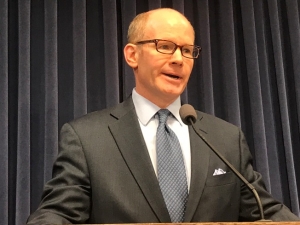
By Dave Dahl
SPRINGFIELD – Just as the dust is settling from the long quest to better pay for K-12 education, Illinois Democrats say it could take a step back. The new formula calls for the state to put in $350 million more. Now the last $150 million of that, says the governor in his Fiscal Year 2021 budget proposal, is contingent on voters passing a graduated income tax.
“I think everyone in the House and Senate wants to evidence-based funding to get its full share, but we also understand we have to live within our means,” said House Majority Leader Greg Harris (D-Chicago).
Shouldn’t Illinois be able to fulfill its commitment to schools without paying more or new taxes?
“Well, then you would have to figure out where that $350 million would come from.”
Republicans say there are other ways to get to 350 (m) million, and they oppose the graduated tax.
“We believe the resources are there,” said Senate Minority Leader Bill Brady (R-Bloomington), “under a different plan, and we are going to argue for that plan.”
While they differ on the graduated tax, Brady and Senate President Don Harmon (D-Oak Park) agree the school funding should be settled before the election.
“I am confident that my caucus would be eager to fully fund the education funding model that we’ve developed and made commitments to over the last couple of years,” Harmon told public television. “I expect we will try to find the resources before May 31,” the last scheduled day of session.
Not confining his complaints to school funding, House Republican Leader Jim Durkin (R-Western Springs) said, “Nobody’s complaining about services being provided. We negotiated a good budget last year. My recommendation to the governor is, let’s abandon” the idea more revenues are needed. “Let’s get on track and negotiate like we did last year.
“We can get this done.”
The fiscal year begins July 1.
Dave Dahl can be reached at [email protected]






